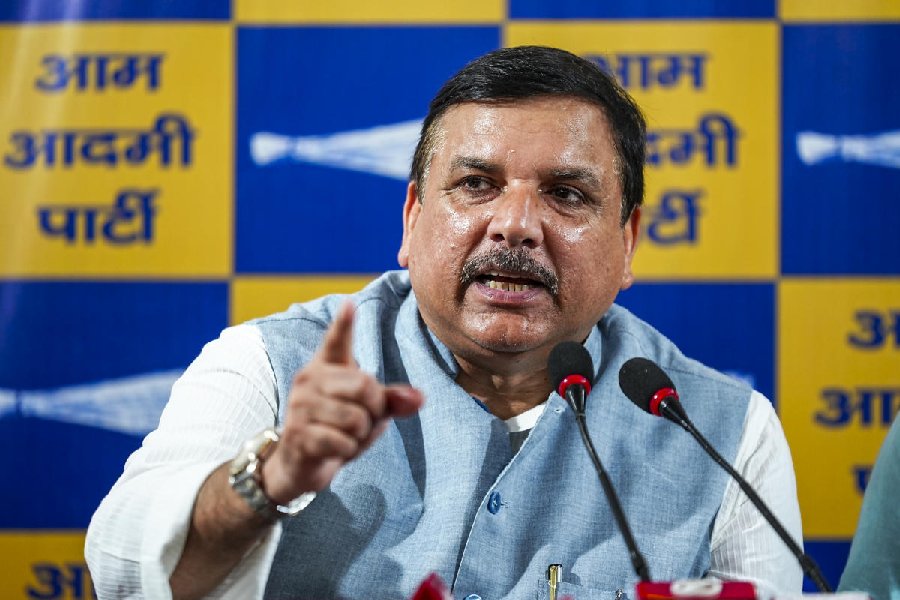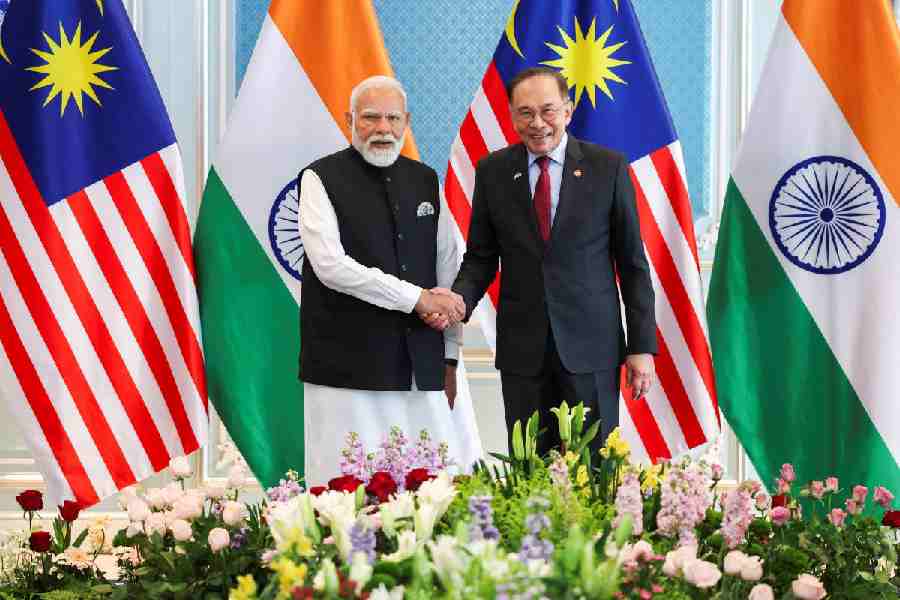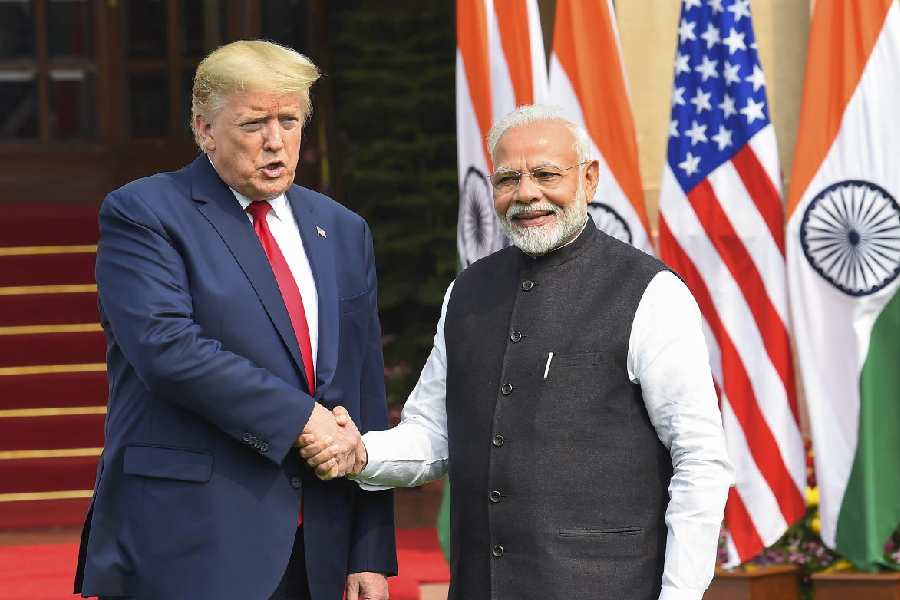It is a perfect English spring day at Hollow Hill Cottage, a large home with an expansive garden, in Hollow Hill Lane, in Iver, Buckinghamshire. The front driveway is blocked by large vans which have brought a film crew equipped with cameras and other paraphernalia. Sangeeta Datta, the director of the English-language movie Life Goes On, is looking remarkably relaxed. The tennis court is unoccupied but the garden is milling with about 50 crew members, English and Indians, setting up for another take.
Act 1, Scene 1
The property’s owner, Sewa Singh Johal, a businessman in hotels and glass manufacturing, beams happily.
Johal: Whisky?
t2: No, thanks. How did the location manager find this house?
Johal: It’s very popular; 21 Bollywood films have been shot here. I don’t know any names, not this film even.
Act 1, Scene 2
Word has been sent to Sharmila Tagore who is in an upstairs bedroom. It is 50 years since Satyajit Ray cast her as Aparna in Apur Sansar. Later, she moved to Bombay to work in Hindi films such as An Evening in Paris and married the cricketer Mansoor Ali Khan Pataudi (“Tiger”). They have three children — Saif, Saba and Soha.
In Life Goes On, Sharmila has been cast as Manju whose story is told in flashback. She is the deceased wife of Sanjay Banerjee, a respected Bengali doctor in London, played by Girish Karnad (after Soumitra Chatterjee withdrew from the role on health grounds). Manju and her husband have three daughters — Lolita, Tulika and Diya.
By and by, Sharmila comes down, wearing jeans with a shawl draped round her shoulders. She looks elegant and graceful. She enters the spacious drawing room and sits down, drawing her legs up on the sofa. She has just shot a scene with Diya, who is played by Soha. Although Sharmila has acted with her son, Saif, in Eklavya: The Royal Guard, this is the first time mother and daughter have been in the same film.
Sangeeta: When we shot the first dramatic scene with Sharmiladi and Soha, a little bit of cinema history was made.
t2: What was this scene you shot with Soha?
Sharmila: It is a scene in which she says, “I have a problem.” She is having an affair, a relationship with a Muslim boy. Her father, my husband, has got this hang-up about Muslims.
t2: Were you supportive as a mother?
Sharmila: The mother’s reaction was, “How can you?” Diya says, “It’s always about your community, your honour. Something that happened in 1947, because of that I can’t marry the man I love. What has it got to do with me or Imtiaz?” Soha did the scene quite well.
t2: There must have been lots of requests for you and Soha to act together?
Sharmila: Not really. This is not gimmicky. The fit was right this time.
t2: Where were your children brought up?
Sharmila: The first seven-eight years were in Bombay, then Delhi. Soha was very close to her grandmother, my mother, and I am so sad she could not see Soha in Khoya Khoya Chand. She passed away. My mother was a great supporter of Soha’s films.
Act 1, Scene 3
Soha enters and sits down on the sofa next to her mother, resting her chin on the arm rest. She is 30, dressed in leggings and also with a shawl to soften her feminine outline. She has inherited her mother’s looks but at the same time they are different. She comes across as confident and speaks in pleasantly crisp English, as though she has stepped into a Noel Coward play. She looks far too exquisite ever to be wasted on a Bollywood badmaash.
Soha: I have done two Bengali films before Rang De Basanti. In Iti Srikanta, I was playing Kamallata. After that I did Antarmahal in which I was a child bride, married to Jackie Shroff. The story was by Tarashankar Bandopadhyay.
t2: You must be proud to be working with your mum?
Soha: I am quite scared to work with her...
Sharmila (cuts in): It happened quite naturally...
Soha: Nobody had approached us with a decent or sensible script before. This was a lovely script.
t2: Is it true you have always wanted to polish your Bengali?
Soha: Absolutely. I would like to do more Bengali cinema because they make interesting films with female protagonist roles — nobody works in Bengal for money. They just all work for the love of art and cinema.
t2: Do you feel Bengali, non-Bengali or just yourself?
Soha: At different times I feel different things. There are various different identities I think, some of them even conflicting, some of them you feel more strongly, more Indian when you watch a cricket match or more Bombay when you watch the IPL. I have friends from different religious backgrounds, so we have celebrated everything at home from Durga Puja to Eid to Diwali. My friends speak a bizarre mix of Hindi and English.
t2: Where did you go to school?
Soha: In Delhi at the British School.
t2: In England?
Soha: I went to Oxford for my undergraduate degree — I was at Balliol, 1996 to 1999 — I loved it.
t2: What was happening then?
Soha: Blair! Blair happened right then, the government changed. Balliol is quite a Leftist College, so we were very happy.
t2: Why did you read history?
Soha: I like stories. I like the past. There is a certain romanticism about it, certain periods of history, especially.
t2: Did your parents come to see you at Oxford?
Soha: Yes, they dropped me off on my first day, which was quite scary! I had never left home before. By the start of the second term I was very much at home and then I was quite sad to leave.
t2: Any acting at Oxford?
Soha: I did some — there was a Pinter play called The Birthday Party. All the Christmas pantomimes don’t count at all as acting but they were fun. We did a version of The Sound of Music. At school, I took part in every play. One of my favourites was A Streetcar Named Desire. I enjoyed it, never with a view to working in films at all. As a student I had lots of extracurricular activities. I loved playing sports.
Sharmila: Tiger was also at Balliol. Tiger’s father was also at Balliol, so it is three generations at Balliol. When we were going in, one of the girls, Niloufer, was showing Soha around. Tiger was saying, “That was the drain pipe I used to climb when I came back at 3 in the morning.” Niloufer turned round and said, “But now uncle, we have a key!” (Laughs) Tiger couldn’t talk for the next five minutes, he was speechless.
t2: Did you see The Parks?
Soha: Yes, of course, saw some cricket matches there as well. I went inside the locker room and saw my father’s name on the board.
(Sharmila remembers that in 2005 Salil Oberoi from Delhi had made 247 against Cambridge at Fenner’s, eclipsing the record 238 not out scored by the Nawab of Pataudi Senior in 1931. Soha’s father sent Salil his congratulations.)
Sharmila: I met Salil.... He tried very hard to get into the Indian team, but now there is a lot of competition.
t2: Is your mum now more a friend than a mother?
Soha: There was a phase when we were more secretive and you talked to your friends. Then I would want to discuss certain things with my mother because I felt the advice I was getting from my friends was what you would want them to say but in terms of experience and wisdom I felt that I needed to speak to my mother.
t2: Did your first scene in Life Goes On with your mother come naturally?
Sharmila: Yes, I think so.
Soha: Certain things did not come naturally, like the language. There is a bit where I say to my mother, “Are you mad?” I would not be comfortable saying that...
Sharmila: Saif says it all the time!
Soha: I don’t...
Sharmila: You don’t...
Soha: Even if I get angry I get more teary... there are certain words I can’t bring myself to say, to my father especially.
Sharmila: You are more respectful, but “are you mad?” is a very common thing.
t2: Have you found your niche in life?
Soha: I have never had a very long-term perspective on life. It’s really been about this year and next year. I have worked in a number of different industries and I have enjoyed everything I have done. I loved going to school, I loved going to university, I loved working at the Ford Foundation, I loved working at City Group as a banker, I love working in films now. For the moment, I don’t want to be anywhere else.
t2: Do you have time for books?
Soha: I do get lots of time to read. When you are working in films, there is a lot of waiting and you can read lots.
Soha leaves as she is summoned for a shot.
Act 1, Scene 4
Sharmila: She reads quite a lot. She had always read, even as a child she was interested in reading. Her thinking is nice. She thinks things through.
t2: What values have you given your children?
Sharmila: We have not been very preachy. All three kids have been allowed a lot of freedom. Saif also was sent to Winchester (a famous English public school). We have invested in education. Value-wise? The usual values all parents give — don’t lie, don’t steal, don’t be rude, respect your elders.
t2: Was it hard to give time to the children?
Sharmila: Working mothers always feel guilty. I gave my daughters more time, more than Saif because with Saif I was very, very busy and this feeling of anxiety and guilt was there. What I was able to do is make them respect work, value work. That is why Soha is a little bit career-driven.
t2: You realise, of course, Calcutta has retained a lot of affection for you and Soumitra since Apur Sansar 50 years ago...
Sharmila: Calcutta does not have too many icons. Once upon a time there were hordes of them, from Ishwar Chandra Vidyasagar to Rammohun Roy. After Satyajit Ray, they have not had an icon until Sourav Ganguly. That is why this madness about Sourav Ganguly. They go ballistic if you say anything about Sourav Ganguly. Soumitra and I most certainly appreciate there is an ‘amader meye amader byapar’ (our girl, our way of doing things). I have never really lost touch with Bengal. I went to a Bengali-medium school and Bengali was my favourite subject. Like Soha says, you don’t work in Bengali films for money.
What would you want to ask Sharmila-Soha? Tell t2@abpmail.com











